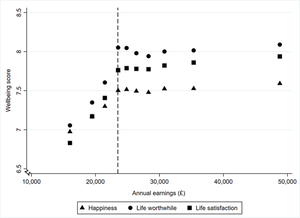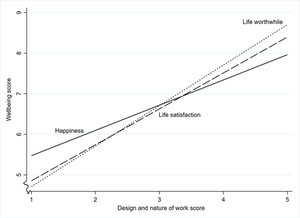What does the survey tell us about graduate wellbeing?
Graduate Outcomes survey responses reveal how meaningful work, not just salary, shapes life satisfaction. By sharing your experience, you help improve job quality and influence policies that support fair, fulfilling careers for future graduates.
Questions about your recent happiness and general satisfaction with life sometimes come as a surprise to graduates taking the survey. But these questions are appearing in more and more surveys as researchers try to understand what drives wellbeing.
The reason for this is that government policies across the UK increasingly refer to the importance of raising wellbeing. And employers are increasingly aware that salary is not the only priority for graduates starting their careers.
As well as telling us something about the outcomes of higher education, the mix of questions in Graduate Outcomes can reveal interesting relationships between work, money, and wellbeing. A recent piece of research from HESA has found that higher earnings only correlate with greater wellbeing up to about £23,500 a year – as shown below in Figure 1.

Happiness and general wellbeing increase with higher earnings up to a salary of about £23,500 per year. After this threshold, higher earnings aren’t associated with greater happiness or wellbeing.
Fair work and fulfilling lives
If you’re in work after graduating, the Graduate Outcomes survey asks you whether your work is meaningful, fits with your plans, and uses the skills you learned in higher education. We use these three ‘graduate voice’ questions to derive a ‘fair work’ score, which reveals something about the quality of different jobs, with a higher score reflecting better quality work.
HESA researchers found a much clearer correlation between this fair work score and graduates’ wellbeing than they did for salaries.
The correlation was stronger for general feelings of satisfaction than for short-term happiness. Earlier research from HESA found that happiness is a more volatile feeling – graduates who took the survey at the weekend were more likely to report being happy than those who answered on a weekday.
Figure 2 shows that differences in the fair work score had a greater association with answers to “How satisfied are you with your life nowadays?” and “To what extent do you feel that the things you do in your life are worthwhile?” compared to “How happy did you feel yesterday?”.

The fair work score correlates more strongly with measures of general wellbeing than with short-term happiness.
Making a difference to work in the future
The insights that your responses to the Graduate Outcomes survey provide add to the evidence that policymakers and employers can use to make work, and life, better for everyone.
So, by answering the wellbeing, graduate voice, and earnings questions in the Graduate Outcomes survey, you can make a real impact on the future of decent, fulfilling work for graduates. If you’ve not yet received the survey, find out when you will in our FAQs and if you’ve received an invitation by email, SMS or a phone call, please take part today.
You can read more about this research on the HESA website: Graduate wellbeing: How does the design and nature of work relate to life evaluations and present emotions?